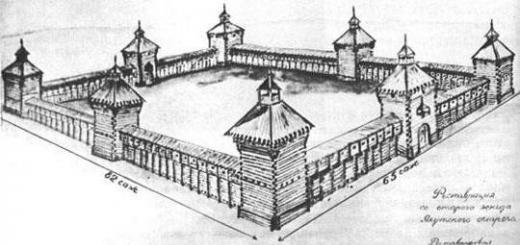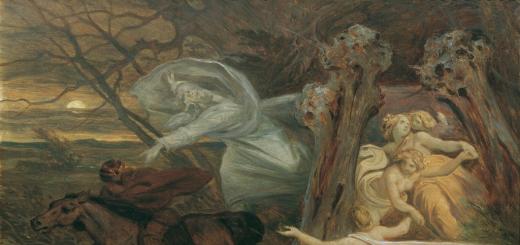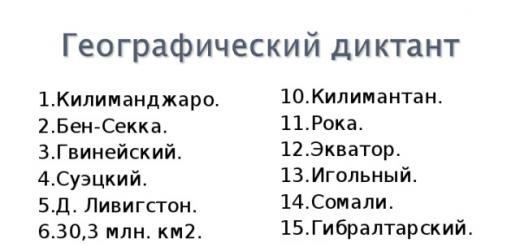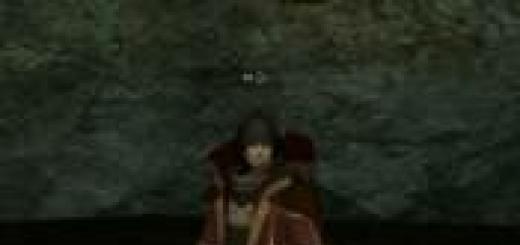Tuwim Julian
Ironic prose
translation from Polish by Asar Eppel
Interview
The business card that the maid handed me said: “Bogdan Ryszard Lupko, writer.” Then the writer Bohdan Ryszard Lupko himself came in, announced that he was Bohdan Ryszard Lupko, a writer, and sat down.
Bohdan Ryszard Lupko looked around the walls, desk, shelves and finally, in a trembling and joyfully excited voice, said:
This, then, is the temple of reflection in which the maestro creates.
The positive impression made on me by Bohdan Ryszard Lupko appeared immediately. I actually hate the “maestros”. But, looking into his blue shining eyes, full of delight and worship towards me (in these eyes there was a whole dedication - long, heartfelt, exaggerated, completed with deep respect and devotion), looking at Lupko’s helpless hands, hands that could be in at the moment the happiest, holding a bouquet of roses (intended, of course, for me) - I felt warm sympathy for Bogdan Ryszard and answered with genuine friendliness:
That's it.
Lupko’s face flushed as if my answer was a sensation, a surprise, something least expected in the world.
With a wet, admiring look, he began polishing the furniture. It turned into the spring sun, from which the unpainted shelves, table, chairs (and myself) shone as if they had been polished.
We were silent for a few moments, both happy and smiling shyly.
I came, maestro, to ask you for an interview. “I edit the literary quarterly for students of the Higher Sericulture Academy (HSA,” he added with a sly smile). Our magazine is called “Call us, early!” And…
The title of the magazine puzzled me so phonetically that I interrupted Lupko and asked him to write the latter on paper. Somewhat reassured by what I saw, I inquired about the magazine’s program, its contents, goals and the like, that is, things that were absolutely unimportant to me.
The writer Bohdan Ryszard cleared his throat, pulled up his chair a little and began to expound with enthusiasm:
Our goal, maestro, is beauty and spirit. We believe in a radiant future, in the victory of goodness and the sun. Our ideals: truth, faith, art and strength. Down with weakness! Down with insanity! We strive for a new dawn! Humanity must be reborn, washed in the well of truth and spirit! Gray everyday life must disappear from the face of the earth - we will replace it with the kingdom of spirit and beauty.
Flaming tomato spots appeared on the naturally pink, noble face of Lupko; With his left hand he maneuvered temperamentally between his heart and the ceiling.
I really liked the quarterly program. The kingdom of beauty and spirit was also my secret dream. Therefore, I asked how the HSA implements its intentions.
It turned out to be very simple. Every quarter there will be an issue called “Call us, early!”, in which faith in beauty, in spirit and in a radiant future will be instilled in humanity. With the help of ideals, truth, art and power, weakness and insanity will be expelled from the world, after which everyone will begin to strive for the dawn - and the peoples will automatically be reborn in the well of truth and spirit. This is where the gray everyday life will disappear, and then the kingdom of spirit and beauty will come.
I won’t lie - I was fired up by these ideas. After all, everything was clear without long words... Just think, a person has been suffering for centuries, working, looking for new roads, swallowing hundreds of books, but is increasingly mired in doubts and internal discord. Meanwhile, this Bogdan Ryszard, with lightning speed, mastered a set of problems and mysteries, outlined a wonderful goal for himself, found simple means to achieve it and - in eagle flight - rushes to victory.
How can I be of assistance to you? - I asked.
We ask, maestro, for an interview! We are waiting for strong masculine words to be heard from the pages of our quarterly...
Please ask questions.
Lupko pulled out a notepad and pencil from his pocket.
What does the maestro think about beauty?
I answered without hesitation:
I believe in a radiant future of beauty.
Fabulous! Fabulous! - Lupko whispered, writing down my unprecedented answer.
What do you think about the spirit, maestro?
Spirit is power. The truth of spirit and faith must shine for humanity, and the road to it leads through the golden gates of art.
Lupko lost his mind with delight.
Right! Right! - he said in a hot, incantatory whisper, writing down my words. - And what, maestro, should be the ideals of humanity?
The ideals of humanity should be strength and faith in the radiant dawn of dawn! The peoples should be reborn in the well of truth and spirit, and their slogan should be the belief that insanity and weakness will disappear from the face of the earth, washed by the dawn rays of the kingdom of the spirit.
Lupko was crying. From his ardent, burning eyes, his tears flowed onto the tomato stains, and the subsequent ones dripped onto a notebook covered with nervous letters.
Well, isn’t it miraculous, isn’t it wonderful,” he exclaimed, “that you, maestro, understand everything and feel like we do!” After all, we didn’t agree! After all, from your lips, maestro, I heard confirmation of our ideals! Yes! We also believe in the radiant victory of the spirit! Our ideals are identical: strength, art and truth! We rush with you to a new dawn!
Together, young friends! - I shouted. - Long live the spirit!
Long live!!! - howled Lupko, already in a trance, already in ecstasy, already mine forever.
And now - the drivers, the girls, they would get drunk, they would fuck and ramble! I growled like a madman, selflessly raising my right hand to the ceiling.
Yes! Yes! - Lupko shouted in idealistic gloom. - Together! Vodka! Girls! Fuck-gobble! Get drunk! To a new dawn! To new dawns!
Bodey and I returned in the radiant glow of a new dawn. It was seven in the morning. Bodya trudged along, battered and dented.
Finally he muttered:
Listen, Yulka!.. Or maybe they’ll sell it at the station?
As you know, railway canteens are open around the clock and without interruption, and recently they have started selling alcoholic drinks there.
City prankster
A million cute jokes and pranks with and without devices
You enter a hardware store when the owner is having breakfast (or lunch) in his half, and the clerk is standing behind the counter.
You come in and with a very serious look, with the look of a man who knows perfectly well what he needs, you ask:
Please give me the Selected Works of Leonardo da Vinci, translated by Staff.
I request the Selected Works of Leonardo da Vinci, translated by Staff.
Sorry... I don’t understand, sir... We have a hardware trade here...
So I say - translated by Staff, two volumes.
I apologize... But you seem to have not noticed... that there is a hardware store...
I know what I'm saying, my dear! And you don't need to teach me. Edition by Mortkovich, translation by Staff, two volumes.
If you please wait then... I’ll go call the owner... otherwise I, by God...
The clerk follows the owner, tells him about the wonderful client and his wild request. A minute later, both appear in the shop. The owner is internally prepared either for a scandal or for having to deal with a mentally ill person. Having looked you up and down, he asks rather menacingly:
Well, sir? What do you want?
And you answered very calmly:
Yes, I came in to buy a nut.
You enter a hat store, go up to the counter, take out a notepad and pencil from your pocket and write on a piece of paper: “Please show me the black bowler hat.” You hand the leaflet to the saleswoman. She reads, looks with compassion at the poor mute and shows you several hats. You try them on, choose one and again write on the piece of paper: “This one will do.” What is the price?"
Touched by your physical defect, the saleswoman decides that you are also deaf, and therefore writes the price on a piece of paper. You read, nod your head, make a gesture expressing regret about the high cost, pay the money and put on a new bowler hat. Then, bowing, you say loudly and clearly:
My regards!
And you leave the store.
At the candy store you ask if there are chocolate letters on sale: 10 “N” letters and 12 “L” letters.
“Unfortunately, not now,” the hostess replies, “but if you would like to come at four, they will be ready.”
You're already in the store at three. You wait, walk around impatiently, and generally act like you’re in a hurry. At exactly four, the helpful hostess shows you 10 chocolate “Ns” and twelve “Ls”.
You widen your eyes, and blood rushes to your head with indignation.
Excuse me, what is this? They are kind of artsy, some kind of curlicues! I need simple printed letters of the Latin alphabet: ten letters "N" and twelve letters "L". Yes-ah-ah, we have order!..
The hostess asks her to excuse her a hundred times, calls a specialist confectioner, and together you explain to him that you should make ten letters “N” and twelve letters “L” from chocolate, and not some others, and, moreover, without any tricks. If you want, you can even draw a picture to the pastry chef of what you need.
The hostess asks to come in at six.
Come in. The letters are ready.
Here, you say, these are good.
Wrap it up? - asks the helpful housewife.
No need,” you answer, “I’ll eat them here.”
Locksmith
Something was clogged in the bathtub, the pipes were making a humming sound, at times turning into a prolonged howl, and the water was barely flowing from the taps. ...
Even as children, we get acquainted with the funny poems of Julian Tuvim: about Mr. Trulyalinsky, Aunt Valya and glasses, the alphabet that fell off the stove, the fool Janek, about the vegetables that the housewife brings from the market. The kind and cheerful lines of Tuvim’s poems remain in our memory for a long time. The wonderful children's poet Samuel Marshak introduces us to these poems.
Some children and their parents did not even suspect that their favorite lines of poetry were written not by Marshak, but by someone else. Few people know about Tuvim in Russia, so let’s try to fill this gap.
Julian Tuwim: biography, creativity
His life was full of contradictions. Many people believe that Julian Tuwim is Unfortunately, few people know that he wrote for adults and did a lot of translations. It was this man who introduced Poland to Russian classical literature. The poetry of Alexander Pushkin, Boris Pasternak, Vladimir Mayakovsky, Afanasy Fet and even “The Tale of Igor’s Campaign” was discovered for the Poles by Julian Tuwim.
His date of birth is September 18, 1884. He was born in the Polish city of Lodz into a Jewish family, but always considered himself a Pole. From birth, the boy heard Polish speech, his grandfather worked in a Polish magazine, his mother sang songs and read poetry in Polish. The family did not live well and was not very friendly, but the boy was happy, as one can be happy and carefree only in childhood.
At school, Julian liked the humanities, but exact sciences were difficult for him, especially mathematics, because of which Tuvim even stayed for the second year in the sixth grade. After graduating from school, I first entered the legal department, and then transferred to the philological department, but never completed it. Poetic activity interfered and distracted me from studying all the time.

By the beginning of World War II, he was already married, there were no children of his own in the family, but the couple were raising an adopted daughter. To save their lives, they were forced to flee Poland. The Tuvims spent seven long years in exile. What countries have you visited during this time: Romania, France, Brazil, Italy, America. They returned to Poland only a year after the end of the war. It was only thanks to his lyrics and his inexhaustible wit that Julian Tuwim survived these difficult years. The biography of this man contained a lot of grief and experiences, but despite this, he was always an optimist and infected those around him with it.
Favorite activities
He really liked chemistry, he loved to conduct various experiments. One of these experiments almost ended in tragedy when an explosion occurred in the home laboratory. After this, Julian decided to choose a less explosive hobby and began collecting stamps and butterflies.
But his favorite pastime was working with words. He liked to rhyme them and come up with new combinations. He could write down in verse a mathematical formula and an excerpt from a historical text. Despite the fact that Tuwim liked to rhyme words, he did not immediately begin to write poetry. This required some kind of reason, a shock. This happened when Julian became acquainted with the poetry of Leopold Staff. His poems struck the young man’s imagination, excited his soul, and the desire to write poetry himself came to him.

Poet Julian Tuwim
The first publication took place in an experantist magazine, he translated two of Staff's poems into Esperanto. He will be engaged in translations throughout his life. Two years later he will write his first poem, “Request.”
The favorite poets that Tuvim always wanted to emulate were Arthur Rimbaud, Kokhanovsky, Slovatsky, Alexander Pushkin, Alexander Blok, and later Vladimir Mayakovsky. Among prose writers, Tuvim really liked the stories of Nikolai Gogol, especially the St. Petersburg cycle.
For some time the author wrote for the stage: vaudeville, humoresques, but real poetry still won. Tuwim lived in an era of social upheaval: the October Revolution in Russia, the First World War, the Second World War, the occupation of Poland, so his poems were political in nature. He could not stay away from what was happening and all his thoughts, his indignation at what was happening, found an outlet in poetry. His friends did not understand him, and his enemies hated him, but the poet could not do otherwise. Once having embarked on the path of serving the truth, Tuwim had no intention of turning away from it.
His favorite genre was satire; he loved to write epigrams and aphorisms. The biting lines made readers die of laughter and buy any publication where Julian Tuwim could be published. At the end of his life, he almost stopped writing poetry, and those that he wrote, he put in a drawer, many of which Poles were able to read only after his death. Tuwim's poems are filled with philosophical meaning and make you penetrate to the very essence of the things he writes about.

The poet's life principles
1. Never evaluate a person by nationality, but only by what he is: smart or stupid, cunning or simple, evil or kind.
2. Never stand aside from public problems. Politics cannot be a profession; if a person has a conscience, he cannot stand aside from it.
3. Endure all life’s adversities with humor.
"Flowers of Poland"
Julian Tuwim began writing his largest work in exile. "Flowers of Poland" - this poem is as significant for the Poles as Pushkin's "Eugene Onegin" is for the Russians and Byron's "Don Juan" is for the English. Critics called it an encyclopedia of Polish life. He wrote almost nine thousand lines, but, unfortunately, Tuwim did not have time to finish this work.
The Polish poet Yaroslav Iwaszkiewicz called Tuwim a sorcerer who knits bouquets of flowers. And about the poem itself he said that you can listen and read it endlessly, enjoying the gentle melody of the lines.
and Tuwim
Julian loved Russia and Russian culture very much, and always regretted that he did not spend the years of his forced emigration in this country.
In 1922, he met the Russian writer Ilya Ehrenburg. They easily found a common language, they were very interested in communicating, although they did not meet often. Ehrenburg spoke of Tuwim as a great master with the purest soul and said that “few people have I loved so tenderly and superstitiously...”

Well-deserved recognition
Everything this amazing, talented man undertook, he did brilliantly. Satirical works, poems for children, journalism, brilliant translations - Julian Tuwim did everything throughout his life. Poetry... After all, it was precisely this that was the main focus of his entire destiny; he devoted his entire life to it, so short, but so bright.
At home, Tuwim’s talent was highly appreciated. He was posthumously awarded the Order of the Renaissance of Poland. He is remembered and revered even years after his death, and 2013 was declared a year of remembrance in Tuwim's homeland.

Fresh as a sip of water from a spring, full of life-loving humor, the poems of Julian Tuwim are rightfully included in the golden treasury of poetry for children. More than one generation will grow up reading them, and today's children will read the poems of this wonderful poet to their children.
Julian Tuwim

Julian Tuwim was initially not a children's poet at all, and he wrote for children only in the thirties. The initial period of his work is characterized by elegiac and even intimate motifs, but gradually, over time, the poet increasingly pays attention to the life of simple, ordinary people, sympathizes with their difficult life, as for example, in the poems “Need”, “Summer of the Poor”, “Poems about lost hope”, at the same time, the poet’s indignation is caused by the petty-bourgeois sentiments of people, such as “Physticians”, “July 14th”. Tuwim wrote a lot about the tasks of art and poetry - “Poetry”, “Word into blood”, “It is better to crush cobblestones”. In the 30s, the poet, together with other Polish writers, protested against the impending war, as for example, in the poem “To the Common Man.” So why did Julian Tuwim, a civilian poet, start writing for children? One day in 1927, Vladimir Mayakovsky, during his visit to Warsaw, stopped by Tuwim and in a casual conversation suggested that he try to write for children. Mayakovsky himself literally persuaded the poet, depicting to him the tempting prospects of a children's writer. And then, a few years later, Pan Trulyalinsky, Pan Malyutkin, the elephant Khobotovsky, and other characters were born. In just a short period of time, the poet wrote more than fifty poems for little children. And after the war, when Tuwim returned to Poland after long wanderings, all the Soviet children unanimously repeated:
What's happened? What's happened?
- The alphabet fell off the stove!..
- What happened to Aunt Valya?
- Her glasses are missing!..
It was in poetry for children that the poet tried to embody all his thoughts and aspirations, love for his homeland, for people, the desire to make life bright and beautiful. Poetry charges with optimism and cheerfulness. This is highly moral poetry, instilling in children a love for everything around them - people and nature. Tuvim helps the child “see” the world, highlighting in it what previously went unnoticed by the child. For example, his amazing, wonderful ABC, where each letter is a separate image, with its own unique shape: What happened? What's happened? Broke U's tail!
But, probably, the most popular is the poem “Steam Locomotive” (translated by M. Zhivov), where the main character is a locomotive, alive, huge, extraordinary “It stands, and it sniffles, and breathes steam.” The locomotive is like a hero, great, strong, who can do what only “a hundred strong men” could do. Tuwim's poetry is always not only fantasy and figurative, but also educational and educational. The kid will probably ask you why the locomotive is moving, and you will find the answer in the poem:
This steam drives him and pushes him.
This steam passes through the pipes to the pistons,
And the pistons set the wheels in motion -
Unfortunately, it is now almost impossible to find a separate translation of Tuwim’s book for children; all his poems are scattered among the books of famous poets, whose names we mentioned above. So, in the book of poems by S. Marshak you will probably come across an amazing poetic poem “The Table”, where the author glorifies the beauty of work, the love of work. Close to this theme is the poetic work “Everything for Everyone” translated by E. Blaginina:
So it turns out this way:
Everything we do is necessary.
So let's work
Honest, diligent and friendly.
Of course, the poet did not ignore the theme of nature. Nature is presented through the prism of a child’s perception. Thus, impressions, emotions, fears are combined into wonderful poetic images:
The wind was angry, it grew,
He whistles and jumps.
(“Frost”, trans. E. Blaginina.)
Y. Tuvim also paints pictures of his native nature in the poems “The Four Seasons” (translated by E. Tarakhovskaya), “Trees” (translated by E. Tarakhovskaya), “Rain” (translated by E. Blaginina), etc.
In his poetry one can feel boundless love and tenderness for children; the poet carefully, without malice and sarcastic hints, so as not to hurt children’s painful pride and fragile psyche, teases children’s vices, gently points out their shortcomings. His poetry really educates and guides children in this world, unobtrusively, sometimes with humor, telling what is good and what is bad. There are countless examples that can be cited, but, probably, “Zosya-Samosya” (translated by V. Ilyina) - a symbol of childish conceit: And Zosya’s mother asked:
- Who is stupid, my daughter?
Zosia doesn’t care what they ask,
He answers importantly: “I am!”
And the poem “About Grishka the Liar and His Aunt” (translated by E. Blaginina), where the boy tells his aunt in detail about how he went to throw away a letter that his aunt allegedly asked him to throw in the mailbox, and in the finale the aunt says:
Sweet, nephew, sweet!
I didn't give you a letter.
Oh, what a liar you are, Grishka,
What a liar!
Try to find his poems at least among second-hand books. Your child will certainly appreciate and love them, because more than one generation has grown up with the poetry of Julian Tuwim.
About Mr. Trulyalinsky
Who hasn't heard of the artist
Tralislav Trulyalinsky!
And he lives in Pripevaisk,
In Veselinsky Lane.
With him is his aunt - Tweedledee,
And my daughter - Tweedledee,
And my little son - Tweedledee,
And the dog - Tweedledee.
They also have a kitten
Nicknamed Tweedledum,
And in addition, a parrot -
Cheerful Tweedledee!
At dawn they rise,
They'll drink tea soon,
And the whole company meets
Early morning with a ringing song.
Tweedled wand
The conductor will raise -
And immediately upon order
A friendly chorus will begin to sing:
"Tru-la-la yes tru-la-la!
Tra-la-la yes tra-la-la!
Honor and glory to Tralislaw!
Praise be to Trulyalinsky!"
Trulyalinsky is almost dancing
Waves the conductor's baton
And, wiggling his mustache, he sings along:
"Tru-la-la!"
"Tru-la-la!" - sounds already
In the yard and in the garage,
And a passing pedestrian
Sings the same song
All drivers are Tweedleders,
Postmen - Tweedledums,
Football players - Tweedled players,
Saleswomen - Tweedledums,
Musicians - Tweedledums,
And the students are Tweedledums,
The teacher himself is a Tweedledee,
And the guys are Tweedledums!
Even mice, even flies
They sing: “Tweedledums!”
All the people in Pripevaisk
He lives happily ever after.
ABC
What's happened? What's happened?
The alphabet fell off the stove!
Painfully sprained my leg
Capital letter M,
G hit a little
It completely fell apart!
Lost the letter U
Your crossbar!
Finding myself on the floor
Broke U's tail.
F, poor thing, it’s so swollen -
No way to read it!
The letter P is turned upside down -
Turned into a soft sign!
The letter C has completely closed -
Turned into the letter O.
Letter A, when I woke up,
I didn't recognize anyone!
Where are the glasses?
What happened to Aunt Valya?
- Her glasses are missing!
The poor old lady is looking for
Behind the pillow, under the pillow,
I climbed with my head
Under the mattress, under the blanket,
I looked into the buckets, into the jars,
In boots, felt boots, boots,
Turned everything upside down
I sat and rested,
She sighed and grumbled
And I went to look first.
Feeling under the pillow again,
He looks behind the tub again.
I lit a candle in the kitchen,
She climbed into the stove with a candle,
Searched the pantry -
All in vain! All for nothing!
Aunt Valya has no glasses -
Apparently they were stolen!
The old woman sat down on the chest.
There was a mirror hanging nearby.
And the old lady saw
Why was I looking for glasses in the wrong place?
What are they really?
They sat on her forehead.
So wonderful glass
Aunt Valya helped.
A confusing song about ducklings
Three ducklings on the way
Walking barefoot just before dawn:
The first one is thick
The third one is thin
And there is simply no second one.
And towards three ducklings
The other two hurry in a crowd:
Gray is the first
In spots - the fifth,
And the thirteenth one is pockmarked.
So they met at the grove,
And the seventh said:
"Hello!
Hello, fat one!
Hello skinny!
Is there someone missing?”
The third grunted:
“What kind of jokes?
Which of us has disappeared again?
No way without mommy duck
Can’t we count ourselves?”
Here the ninth with the first became
Cry and sob loudly:
"We first
The three of us ran
And now there are only five of us.”
And then the fifth whined:
“I don’t know what’s wrong with me:
Came out third
I was in thirtieth
And now it’s quite the eighth?”
“How, brothers, can we be counted?
To count yourself?
"It's so easy
Get lost."
“Will you find me again?”
The ducklings wandered to their mother
Through the grove, straight,
And even though they weren’t
Geese,
Friend after friend
We walked
Single file.
About Janek
Janek lived in the world,
He was stupid.
If you want to know -
That's what he did.
He drew water with a sieve,
He taught the birds to fly,
He asked the blacksmith
Shoe the cat.
Seeing a mosquito
I took up the ax
He carried firewood into the forest,
And the apartment is dirty.
He built in winter
Ice house:
"There will be a dacha
It’s spring for me!”
On a hot summer afternoon
He was blowing in the sun.
The horse is tired
He carried out a chair.
Somehow he's fifty dollars
I paid it for a nickel.
It's easier to explain to you:
Janek was a fool!
Vegetables
The hostess came from the market one day,
The hostess brought home from the market:
Potatoes
Cabbage,
carrots,
Peas,
Parsley and beets.
Oh!.. Here the vegetables started a dispute on the table -
Who is better, tastier and more necessary on earth:
Potato?
Cabbage?
Carrot?
Peas?
Parsley or beets?
Oh!.. Meanwhile the hostess took the knife
And with this knife she began to chop:
Potatoes
Cabbage,
carrots,
Peas,
Parsley and beets.
Oh!.. Covered with a lid, in a stuffy pot
Boiled, boiled in boiling water:
Potato,
Cabbage,
Carrot,
Peas,
Parsley and beets.
Oh!..
And the vegetable soup turned out to be not bad!
Bird radio
Attention! Attention!
Today at five o'clock
Today to our studio
(Attention attention!)
Different birds will flock to the radio meeting!
Firstly, on the question:
When, at what time
Is it more convenient and profitable to use dew?
The second question is long overdue:
What is an "echo"?
And if there is it in the forest,
Where is it hiding?
On the third question
Drozd reports,
Appointed to manage
repairing bird nests.
Then the debate begins:
And whistling, and creaking, and singing,
Rumbling and squealing,
And chirping and chirping.
Performances will begin
Starlings, goldfinches, tits
And everyone without exception
Other famous birds.
Attention! Attention!
Today at five o'clock
The station will work for groves and forests!
Our receiver at five o'clock
Received a hundred votes:
"Fiur-fiur! Fu-fu-fuo!
Tick-tweet! Tew-tew-tew-tew!
Pew Pew! Tsvir-tsvir-tsvir!
Chivi-chivi! Tyr-tyr-tyr!
Sleep, sleep, sleep! Lu-lu! Tsik-tsik!
Shadow-shadow-shadow! Chu-ik! Chu-ik!
Ko-ko-ko! Cuckoo! Cuckoo!
Gur-gur-gur! Ku-ka-riku!
Ka-arr! Ka-arr! Pi-it! Drink!.."
We didn't know what to do!
Obviously at this hour
The transfer is not for us!
River
Like a shiny ribbon
The river flows
Real.
And the day flows
And it flows at night -
Turn right
Turn left.
And the water in the river is freezing,
Grumpy near the shores,
And in the middle is lazy.
Why should she grumble, river water?
No one will say this anywhere.
Perhaps stones and fish
You could say this
But the fish are silent
And the stones are silent,
Like fish.
Table
A tree grew in our Polesie,
Stately, tall - up to the skies.
The boys had to work a lot,
Before the tree fell to the ground.
Good horses in foam and soap
They dragged him to the sawmill.
The saws cut it into planks,
The teeth bent on its hard trunk.
The boards and planks were rough.
They were hired by a carpenter from Warsaw.
Experienced master Adam Wisniewski
Handles planes, saws, chisels.
For a long time he planed, glued, drilled,
Before this glorious table celebrated.
That's how much difficult work is needed,
May your honor sit at the table!










